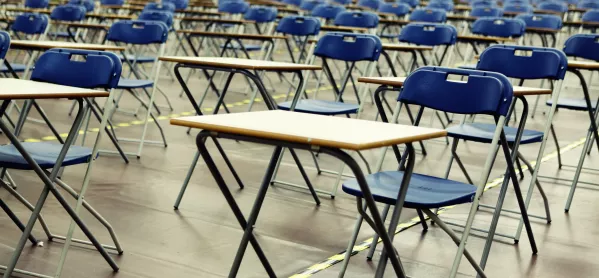
- Home
- ‘How do we ensure fair grades for BAME students?’
‘How do we ensure fair grades for BAME students?’

The requirement for teachers in Scotland to predict grades for 2019-20, after the Covid-19 outbreak led to the cancellation of exams, leads to all sorts of issues - not least for black, Asian and/or minority ethnic (BAME) students.
There are three factors that apply quite starkly to the issue of teacher assessment and predicted grades:
Our responsibility as teachers has taken on a whole new meaning now, as many are being asked to assess students’ future capabilities like never before. Just this week, the Scottish Qualifications Authority (SQA) has issued guidance for teachers on how to predict students’ grades.
Background: Grade system is fair, insists Swinney
Coronavirus: No checks for bias within schools in England
LISTEN: Why it is crucial to get more BAME teachers working in schools
Podcast: ‘Use the school curriculum to tackle racism’
BAME teachers: ‘We must end the unconscious bias in teaching’
Unfortunately, prediction of grades has never had much good press, with particular concerns around BAME students and those from disadvantaged backgrounds. What really concerns me is that these issues are not new. In 2017, for example, the Sutton Trust produced a report, Rules of the Game, which stated that “high-attaining disadvantaged students are more likely to have their grades underpredicted than their richer counterparts”.
No doubt there are a multitude of factors that may influence how grades are predicted, but there are growing voices pointing towards bias as a troubling influence.
The impact of coronavirus exam cancellations
Firstly, numerous studies highlight how we can all suffer from unconscious bias in our daily lives; teachers are no exception. We all come into the profession to promote fairness, equality and opportunity for all, but there is growing concern that bias still informs some of our decisions.
Pran Patel, of theteacherist.com, has produced a variety of reports on this issue. He cites a study from 2006, which found that predicted grades for BAME pupils were always lower than for white students. These biases can be based on the different viewpoints we have of our students, which may be based on their behaviour, their race or gender, their socioeconomic group, or whether they are EAL (English as an additional language) students.
How do we address these unconscious biases, which appear to continue year after year? There are equality and diversity groups set up in various local authorities, but how many people are aware of them and take advantage of them? For example, Glasgow City Council offers race-equality training through its internal training system, but I haven’t met many teachers yet who have completed it. I would argue we should do a refresher every year, in the same way as we do for child protection.
Increasing the diversity of the teaching profession would be helpful. The more diversity that exists among peers at work, the better our understanding grows of each other and our pupils. The Teaching in a Diverse Scotland report of 2018, by Professor Rowena Arshad, highlighted this very issue, but its recommendations have still to be implemented. She provided evidence of the barriers teaching staff face in terms of promotion, so why do we think this bias may not exist in treatment of pupils?
Also, there is no doubt that our relationships with students is affected by the relationships we have with their families and carers. We all have students we know better than others, often because we have regular catch-ups with their families who enjoy engaging with the school.
But what about those families we are not successful in engaging with? We feel distant from them and, in a way, their children, too. To fully understand our students’ abilities, surely it is important to understand the “holistic” child, taking into consideration their family circumstances, the support available to them, the aspirations their family has for them. Again, it is families from BAME and disadvantaged backgrounds that we often struggle to engage with.
Last month, the Runnymede Trust published a book looking at race and inequality in the UK. It highlights many socioeconomic factors that affect ethnic minorities, and the varying levels of attainment within different minority groups. Time and time again, the barriers faced by ethnic minorities and disadvantaged pupils are historic - it’s just always been like that. But it doesn’t have to be.
Today, many ethnic minorities and workers from disadvantaged families are key workers supporting our society, keeping the rest of us fed and healthy. They want the best opportunities for their children as much as any one of us, so let’s take a holistic view of all our young people and their aspirations.
If ever there was a time to change things, surely this is it.
Nuzhat Uthmani is a primary teacher and trade union representative in Scotland
Register with Tes and you can read five free articles every month, plus you'll have access to our range of award-winning newsletters.
Keep reading for just £4.90 per month
You've reached your limit of free articles this month. Subscribe for £4.90 per month for three months and get:
- Unlimited access to all Tes magazine content
- Exclusive subscriber-only stories
- Award-winning email newsletters
You've reached your limit of free articles this month. Subscribe for £4.90 per month for three months and get:
- Unlimited access to all Tes magazine content
- Exclusive subscriber-only stories
- Award-winning email newsletters



